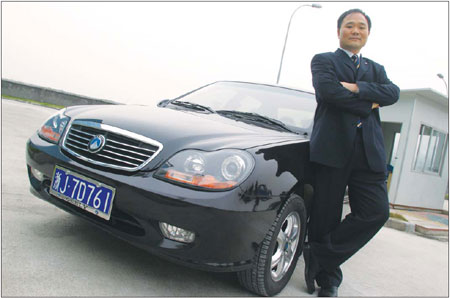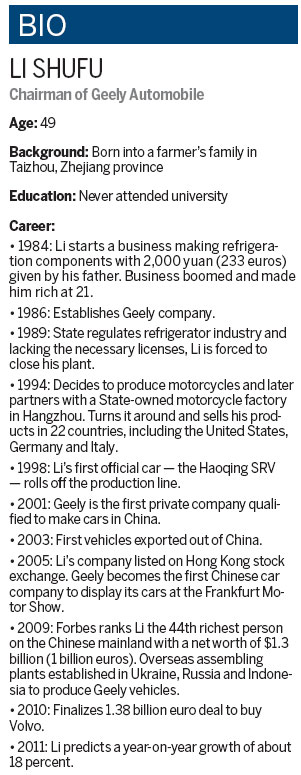Driving ambition
Updated: 2011-01-14 11:25
(China Daily European Weekly)
|
|||||||||||
 |
|
Li Shufu, a pioneer in the Chinese auto industry, is pushing |
Fresh from a deal with Volvo, Li Shufu wants to give people what they want
In Chinese business circles, Li Shufu is a controversial person. When he began to develop motorcycles, some thought he was destined to fail. He faced pressure when he withdrew his sponsorship of a Guangzhou soccer team because of controversy surrounding referees. When he followed his dream of making cars, people said he was out of his mind because after all, a private company had never entered the industry.
Nevertheless, Li started his Geely Automobile, a name that is fast becoming one of China's best-known brands around the world thanks to its 1.38 billion euro acquisition of Volvo last year.
These achievements have come to Li before the age of 50.
Li was born in 1963, the Chinese Year of the Rabbit, which happens to fall again in 2011. According to the zodiac sign, rabbits are gamblers, talented, ambitious and are financially lucky.
 |
This year is shaping up to be another lucky one for Li, but what does he particularly wish for?
"I am happy when all the work is done properly and our business is well on track," he says. "I will be even happier if cars made by Geely can run in every corner of the world one day.
"This is our mission."
Born into a farmer's family in Taizhou, Zhejiang province, Li skipped university like many of his friends at that time and in 1984 started a business making refrigeration components with 2,000 yuan (233 euros) from his father.
He lured many investors at first, but most of them dropped out because of technical problems. So Li turned to experts and big factories and set up his own plant. His products sold nationwide and made him rich at 21.
In 1989, the State began to regulate the refrigerator industry and lacking the necessary licenses, Li was forced to close his plant.
He learned important lessons: Never give up easily and always think outside the box.
China is often criticized for lacking creative talent, a point that Li takes to task.
"Chinese people are very creative in my personal view," he says. "The reform and opening-up endeavor initiated by late leader Deng Xiaoping is one of the most creative policies worldwide in the past decades.
"To be creative and find the way out of the commonplace, we need to understand the essentials of great thinking like this and always stick to the truth.
"China is already the most challenging yet promising arena for business practices and I am sure more and more business talent will be cultivated here."
Li's creative business adventures continued in 1994, when he decided to produce motorcycles. But he needed approval from the Ministry of Machine-Building Industry. He went to the ministry but did not make it past the front door.
His next step was to partner with a near-bankrupt State-owned motorcycle factory in Hangzhou and turn it around. Very soon, Li's motorcycles were being sold in 22 countries, including the United States, Germany and Italy.
Li called his brand Geely, meaning good luck, and in three years his motorcycles outsold his rivals. Geely soon became the fourth largest private company in the nation.
Li's ambitions moved from two-wheels to four but it wasn't until 1998 that his first car - the Haoqing SRV - rolled off the production line. It would take another three years before Geely officially became the first private company qualified to make cars in China.
Li was confident that China's aspiring car owners wanted a car but were being blocked by major automakers, which were reluctant to produce such vehicles because of the narrow profit margins.
"Making cars is not as mysterious as people think. A car is merely four wheels, a steering wheel and an engine," Li says. "The level of technology used in manufacturing cars is very high. It seemed to me that I just needed to buy the technology and the parts, and pay for engineers."
On Oct 30, 2001, 10 days before China entered the World Trade Organization, the government certified Geely's JI-6360 model.
Soon after, State-owned enterprises began to reduce the prices of their compact cars creating a market much more suitable for Geely. In 2003, the company exported its first vehicle outside of China.
In May 2005, the company was listed on the Hong Kong stock exchange, and in September, Geely became the first Chinese car company to display its cars at the Frankfurt Motor Show.
Since then, Li's understanding of and connection with the European business community has grown and he praises the practices he has witnessed, especially in the auto industry.
"Generally speaking, the Western culture advocates freedom and equality between people, while people in the East respect rituals and protocols more," Li says. "The business practice in Europe is very much contractually based and people are very professional. They have a more mature commercial culture and market scheme."
After pulling the coup of his lifetime and finalizing the deal with Volvo in August last year and after two years of negotiations, Li has come under fire by industry critics who are concerned that Volvo's world-class brand could suffer by association with a Chinese brand, which is "so-so" even by Chinese standards. In 2009, Beijing-based research company Lansion rated Geely 14th among 35 brands in China.
But Li insists the two brands are completely separate creatures. "As I have said many times, Volvo is Volvo, Geely is Geely. They are two different entities and we will run them separately," he says. "Volvo will adhere to its brand values and the same quality standards, no matter where the cars are produced.
"Consumers worldwide can rest assured that they will find Volvo even more complete by all dimensions in the years ahead."
As regards to Geely, Li is confident the Year of the Rabbit will be another successful period of selling cars despite a change in government tax policy, which will hurt makers of smaller cars.
Despite the setback, Li is hoping to gain a year-on-year growth of about 18 percent in 2011.
"Geely will launch more models on the market this year. Our dealership will be expanded and strengthened," he says. "We will continue to improve the quality and service of our products. We will make more efforts in our marketing and branding.
"We are optimistic of the stable development of the Chinese car market in the long term because China is still much below the world average in terms of car ownership per thousand people.
"As people are getting more and more well off here, they want to buy cars to improve their quality of life and gain more mobility.
"And we plan to help them."
China Daily











